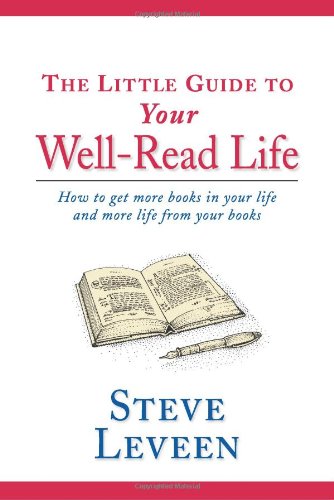I never seem to have enough time to read all the books I want to read. So I grabbed this book, which promises to put more books in your life (including itself, I suppose).

The thing I really liked is the idea of maintaining a Library of Candidates, a fancy name for the pile of books you own but have not yet read. Having lots of unread books has always seemed like a bad thing to me. I have thought of it like a large pile of clothes that have to be ironed, as if reading books were an arduous chore instead of a pleasure. Instead, I should revel in the number of unread books on my shelf, secure in the knowledge that I won’t run out. I will keep all such books together on my shelves, so I can easily choose one during those happy moments when I have time to start a new book.
This won’t really help me with my ironing, but at least it’s a start.
This book also recommends audiobooks as a way to read more. It would be great for people who drive alone a lot, but I never do. My available audio time is when I’m either walking to or from work, or doing some chore like washing the dishes. This barely gives me enough time to listen to the Philosophy Bites and RSA podcasts, as well as various Radio New Zealand podcasts. So audiobooks are pretty much out of the question.
Book clubs are a good way of forcing you to start and continue with a book, as well as putting you onto books that you otherwise wouldn’t have read. They are also a nice way of getting you to go outside, squinting in the unfamiliar sunlight on your way to your book club meeting instead of sitting in your comfortable squashy armchair, curled up with a good book and a lukewarm, forgotten cup of tea. Or maybe that’s just me.
Now, some people think writing notes in books is only a notch above burning them. I used to think along these lines, but I have been fascinated by annotations in books so many times that I am now a firm believer in handwriting in books. I fondly imagine some great-grandchild of mine in years to come, opening a book and seeing some incisive comment written in my handwriting. And hopefully not thinking, “who’s that vandal who ruined this book?”
Happy as I was to stumble upon this book, it is pretty light reading. I’ve heard that the real classic is How to Read a Book by Mortimer Adler and and Charles Van Doren. I’ll be seeking that one out soon. And one day I will read a book that isn’t about reading books.
We are a not-for-profit educational organization, founded by Mortimer Adler and we have recently made an exciting discovery–three years after writing the wonderfully expanded third edition of How to Read a Book, Mortimer Adler and Charles Van Doren made a series of thirteen 14-minute videos–lively discussing the art of reading. The videos were produced by Encyclopaedia Britannica. For reasons unknown, sometime after their original publication, these videos were lost.
Three hours with Mortimer Adler and Charles Van Doren, lively discussing the art of reading, on one DVD. A must for libraries and classroom teaching the art of reading.
I cannot exaggerate how instructive these programs are–we are so sure that you will agree, if you are not completely satisfied, we will refund your donation.
Please go here to see a clip and learn more:
http://www.thegreatideas.org/HowToReadABook.htm
ISBN: 978-1-61535-311-8
Thank you,
Max Weismann